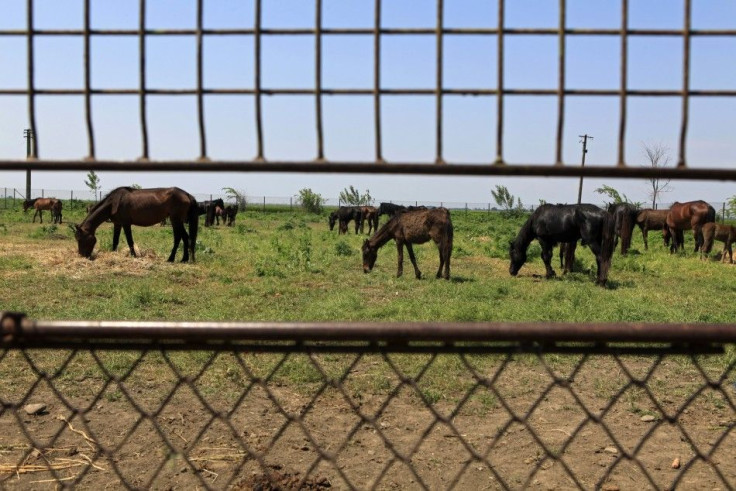Horse Slaughter Coming Back to U.S.: PETA Supports, Humane Society Against

Horse slaughter is set to make a comeback in this country, likely within 30 to 90 days. Horse slaughter for edible meat has been banned in the U.S. since 2007, but now Congress has lifted that ban and all indications are that it's coming back.
But the controversial horse slaughter issue has some interesting sides of how is for it, and who is against it -- particularly in the animal rights side. PETA, interestingly, supports the change, while the Humane Society is against it.
PETA, now for its aggressive positions in the fight to protect animals, opposes the slaughter or horses for meat. The organization says, however, that the reopening of slaughterhouses in the U.S. could reduce animal suffering, since some argue that the ban on horse slaughter increased abandonment of older horses -- those that would typically end up in a U.S. slaughter house (meat of older horses is said to be more tender).
PETA does suggest that the U.S. should ban horse slaughter domestically as well as the export of horses for slaughter, which has been occurring since 2007, as horses have been shipped to Canada and Mexico for slaughter.
PETA was always worried about the horse-slaughter bill, fearing that it might cause more suffering while the option existed to ship horses on a frightening, long, and miserable journey to Canada or Mexico to meet their end in slaughterhouses there, PETA said in a statement to the Los Angeles Times. But the better option is to ban slaughter in the U.S. and ban the export of live horses so that no one is slaughtering America's horses.
In other words, the return of horse slaughter in the U.S. is the best option in the current environment, from PETA's perspective.
The Humane Society sees it differently.
Plants that may open for the purpose of horse slaughter, primarily to serve those who eat horse in Europe and Asia, considering the meat a delicacy, can expect to face a fight in the communities where they operate, says Wayne Pacelle, president and chief executive officer of The Humane Society of the United States. The organization is threatening protests and legal actions if necessary.
Local opposition (to plants) will emerge and you'll have tremendous controversy over slaughtering Trigger and Mr. Ed, Pacelle said.
The Humane Society has a firm position against horse slaughter. The organization argues that plants in the U.S. are not a better alternative to foreign-owned plants across the border, in Canada and Mexico where slaughter has been primarily conducted with many exported U.S. horses in the five years since a ban was effectively imposed before recently being lifted.
Undercover footage from inside these horse slaughter facilities in the U.S. demonstrated how horrific these plants were-many horses were conscious when they were shackled and hoisted by a rear leg to have their throats cut, said the Humane Society in a position statement in 2010. Slaughter is not euthanasia-it is a brutal and terrifying end for horses. We should not allow our horses to be subjected to this tremendous cruelty inside-or outside-of our borders.
The Humane Society also argues that the ban on horse slaughter did not lead to an increase in unwanted horses or abandonment, as some argue.
USDA statistics show that more than 92 percent of horses slaughtered are in good condition and able to live productive lives. In California, where horse slaughter was banned in 1998, there has been no corresponding rise in cruelty and neglect cases, while horse theft dropped by 34 percent after the ban.
The Humane Society says that most horses that go to slaughter are in good condition.
USDA documents that more than 92 percent of horses who go to slaughter are in good condition-they will not need to be euthanized. Some 900,000 horses die annually and are safely disposed of by means other than slaughter, and the infrastructure can easily absorb an increase in numbers, the Humane Society says.
© Copyright IBTimes 2025. All rights reserved.





















